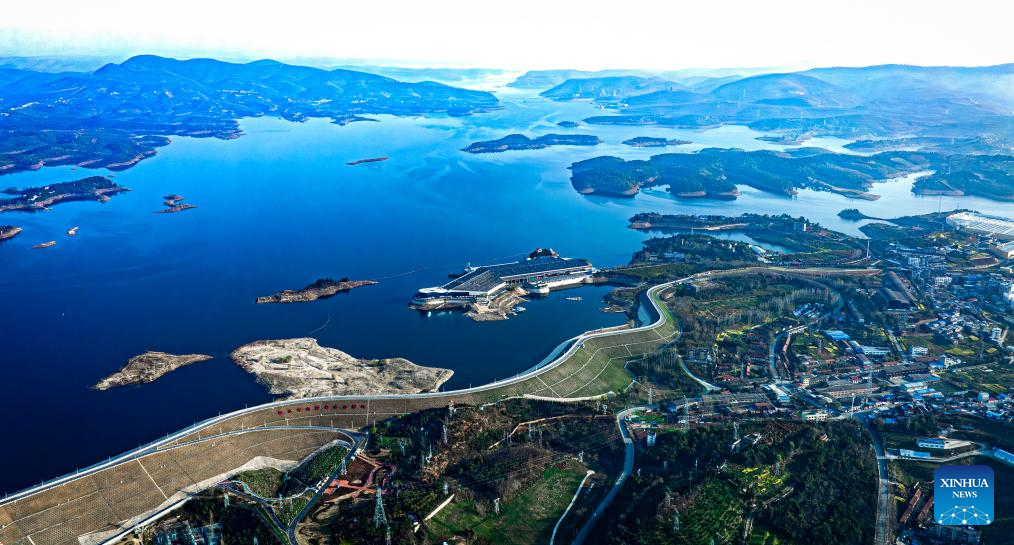
An aerial drone photo taken on March 22, 2024 shows the Danjiangkou Reservoir in central China's Hubei Province. China's South-to-North Water Diversion Project has three routes. The middle route, the most prominent of the three as it feeds water to the nation's capital, starts at the Danjiangkou Reservoir and runs across the Henan and Hebei provinces before reaching Beijing and Tianjin. It began supplying water in December 2014. So far, the middle route has transferred over 68 billion cubic meters of water, and benefited over 100 million people in Beijing, Tianjin, Henan and Hebei. (Xinhua/Xiao Yijiu)
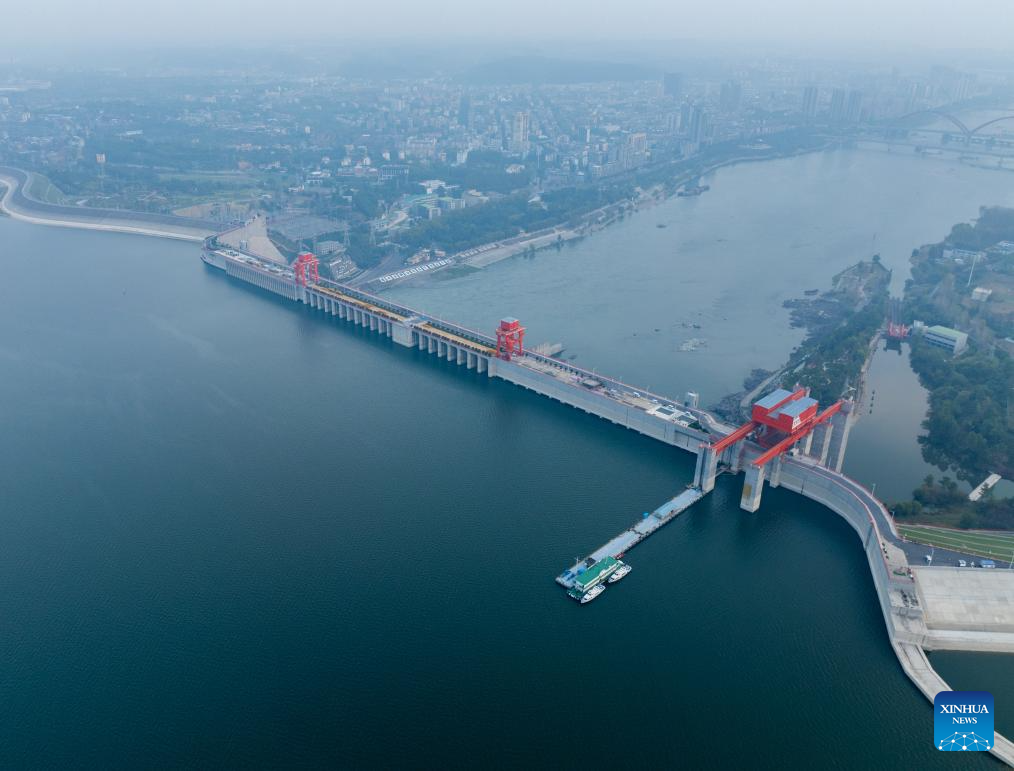
An aerial drone photo taken on Oct. 29, 2024 shows the Danjiangkou Reservoir in central China's Hubei Province. China's South-to-North Water Diversion Project has three routes. The middle route, the most prominent of the three as it feeds water to the nation's capital, starts at the Danjiangkou Reservoir and runs across the Henan and Hebei provinces before reaching Beijing and Tianjin. It began supplying water in December 2014. So far, the middle route has transferred over 68 billion cubic meters of water, and benefited over 100 million people in Beijing, Tianjin, Henan and Hebei. (Xinhua/Hu Jingwen)

An aerial drone photo taken on Oct. 29, 2024 shows the Danjiangkou Reservoir in central China's Hubei Province. China's South-to-North Water Diversion Project has three routes. The middle route, the most prominent of the three as it feeds water to the nation's capital, starts at the Danjiangkou Reservoir and runs across the Henan and Hebei provinces before reaching Beijing and Tianjin. It began supplying water in December 2014. So far, the middle route has transferred over 68 billion cubic meters of water, and benefited over 100 million people in Beijing, Tianjin, Henan and Hebei. (Xinhua/Hu Jingwen)
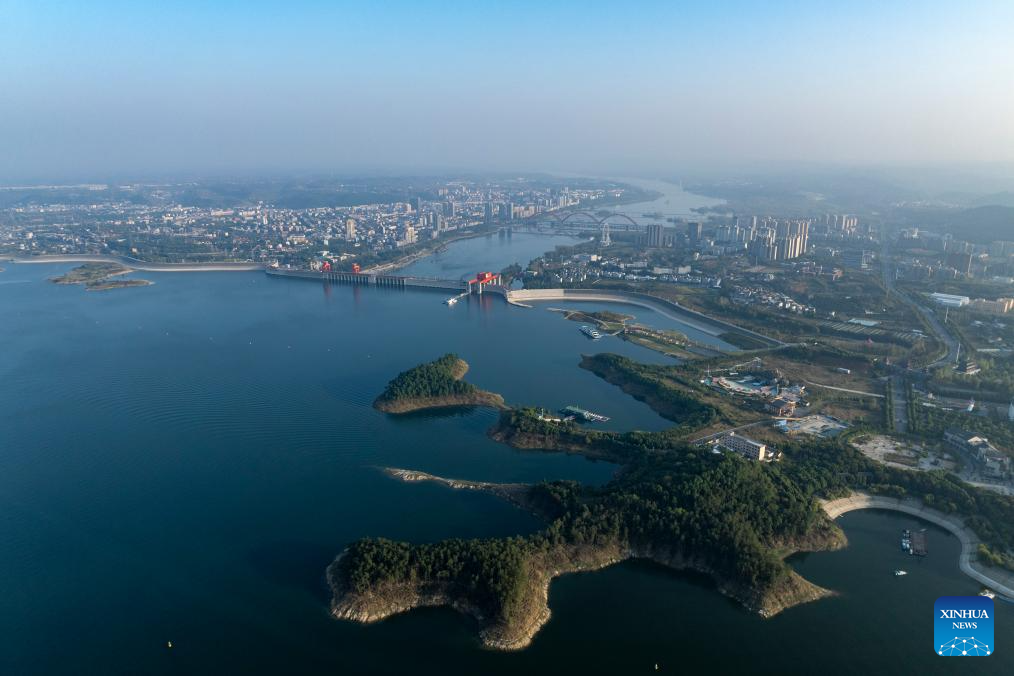
An aerial drone photo taken on Oct. 25, 2024 shows the Danjiangkou Reservoir in central China's Hubei Province. China's South-to-North Water Diversion Project has three routes. The middle route, the most prominent of the three as it feeds water to the nation's capital, starts at the Danjiangkou Reservoir and runs across the Henan and Hebei provinces before reaching Beijing and Tianjin. It began supplying water in December 2014. So far, the middle route has transferred over 68 billion cubic meters of water, and benefited over 100 million people in Beijing, Tianjin, Henan and Hebei. (Xinhua/Wu Zhizun)
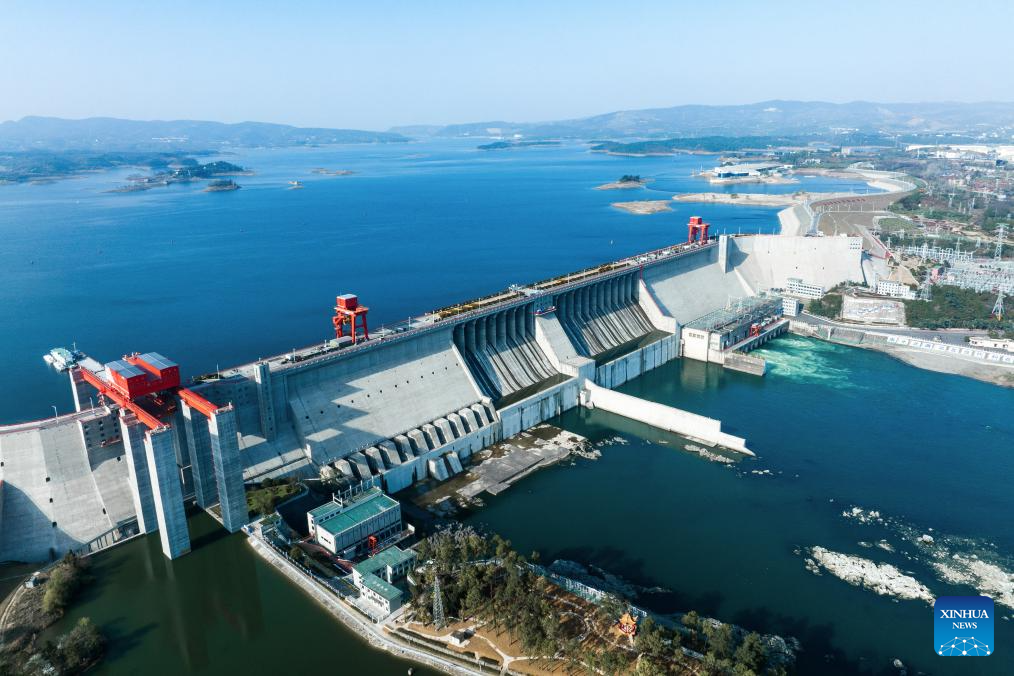
An aerial drone photo taken on March 21, 2024 shows the Danjiangkou Reservoir in central China's Hubei Province. China's South-to-North Water Diversion Project has three routes. The middle route, the most prominent of the three as it feeds water to the nation's capital, starts at the Danjiangkou Reservoir and runs across the Henan and Hebei provinces before reaching Beijing and Tianjin. It began supplying water in December 2014. So far, the middle route has transferred over 68 billion cubic meters of water, and benefited over 100 million people in Beijing, Tianjin, Henan and Hebei. (Xinhua/Xiao Yijiu)
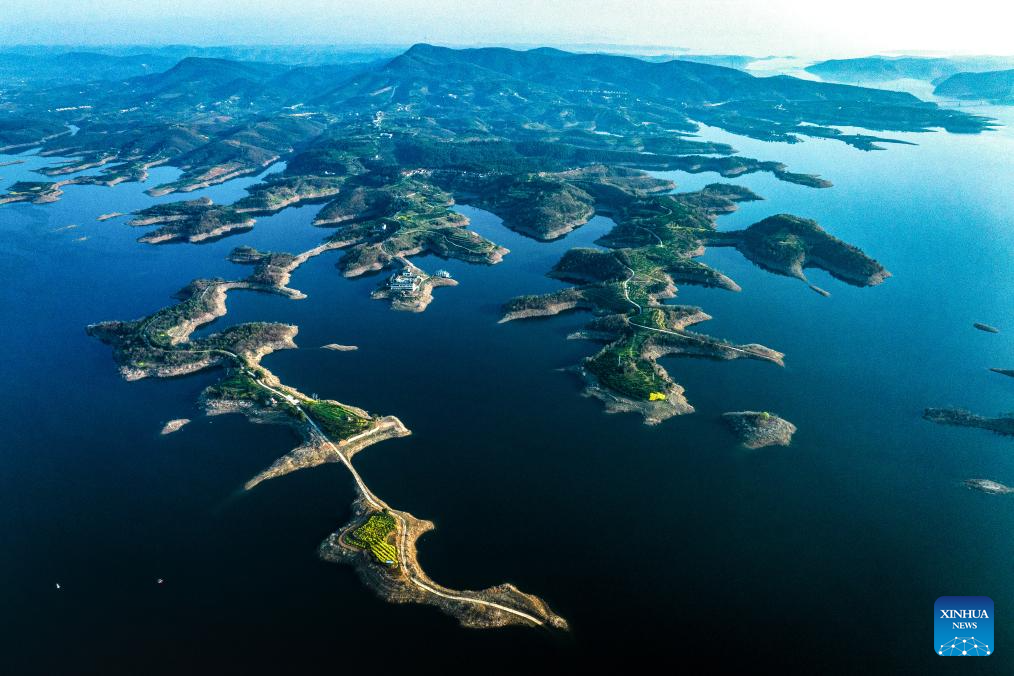
An aerial drone photo taken on March 22, 2024 shows the Danjiangkou Reservoir in central China's Hubei Province. China's South-to-North Water Diversion Project has three routes. The middle route, the most prominent of the three as it feeds water to the nation's capital, starts at the Danjiangkou Reservoir and runs across the Henan and Hebei provinces before reaching Beijing and Tianjin. It began supplying water in December 2014. So far, the middle route has transferred over 68 billion cubic meters of water, and benefited over 100 million people in Beijing, Tianjin, Henan and Hebei. (Xinhua/Xiao Yijiu)
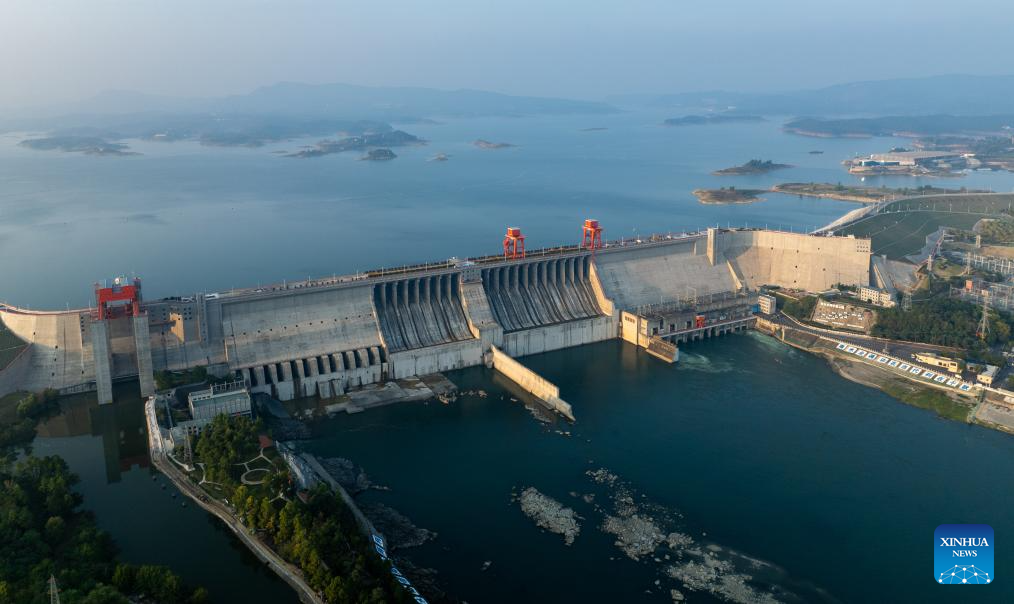
An aerial drone photo taken on Oct. 28, 2024 shows the Danjiangkou Reservoir in central China's Hubei Province. China's South-to-North Water Diversion Project has three routes. The middle route, the most prominent of the three as it feeds water to the nation's capital, starts at the Danjiangkou Reservoir and runs across the Henan and Hebei provinces before reaching Beijing and Tianjin. It began supplying water in December 2014. So far, the middle route has transferred over 68 billion cubic meters of water, and benefited over 100 million people in Beijing, Tianjin, Henan and Hebei. (Xinhua/Hu Jingwen)
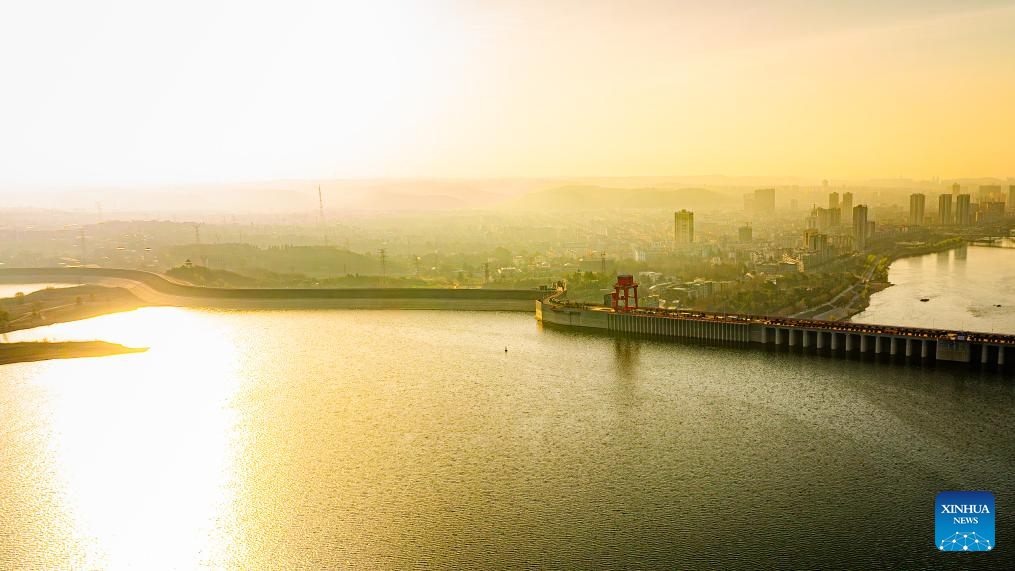
An aerial drone photo taken on March 22, 2024 shows the Danjiangkou Reservoir in central China's Hubei Province. China's South-to-North Water Diversion Project has three routes. The middle route, the most prominent of the three as it feeds water to the nation's capital, starts at the Danjiangkou Reservoir and runs across the Henan and Hebei provinces before reaching Beijing and Tianjin. It began supplying water in December 2014. So far, the middle route has transferred over 68 billion cubic meters of water, and benefited over 100 million people in Beijing, Tianjin, Henan and Hebei. (Xinhua/Xiao Yijiu)
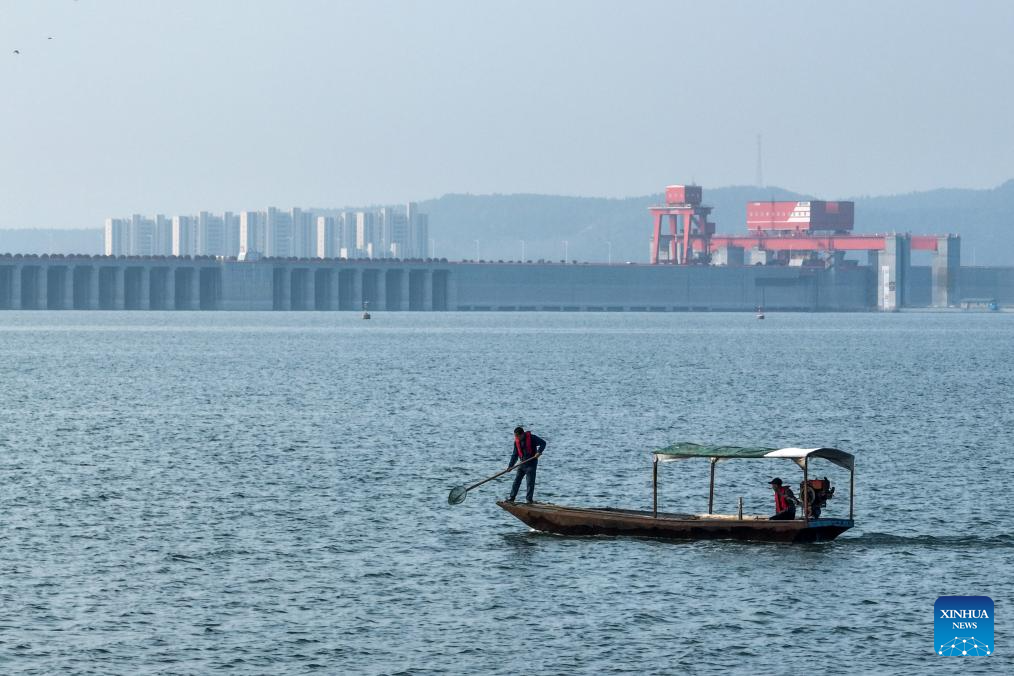
An aerial drone photo taken on Oct. 28, 2024 shows a worker clearing garbage on the Danjiangkou Reservoir in central China's Hubei Province. China's South-to-North Water Diversion Project has three routes. The middle route, the most prominent of the three as it feeds water to the nation's capital, starts at the Danjiangkou Reservoir and runs across the Henan and Hebei provinces before reaching Beijing and Tianjin. It began supplying water in December 2014. So far, the middle route has transferred over 68 billion cubic meters of water, and benefited over 100 million people in Beijing, Tianjin, Henan and Hebei. (Xinhua/Wu Zhizun)
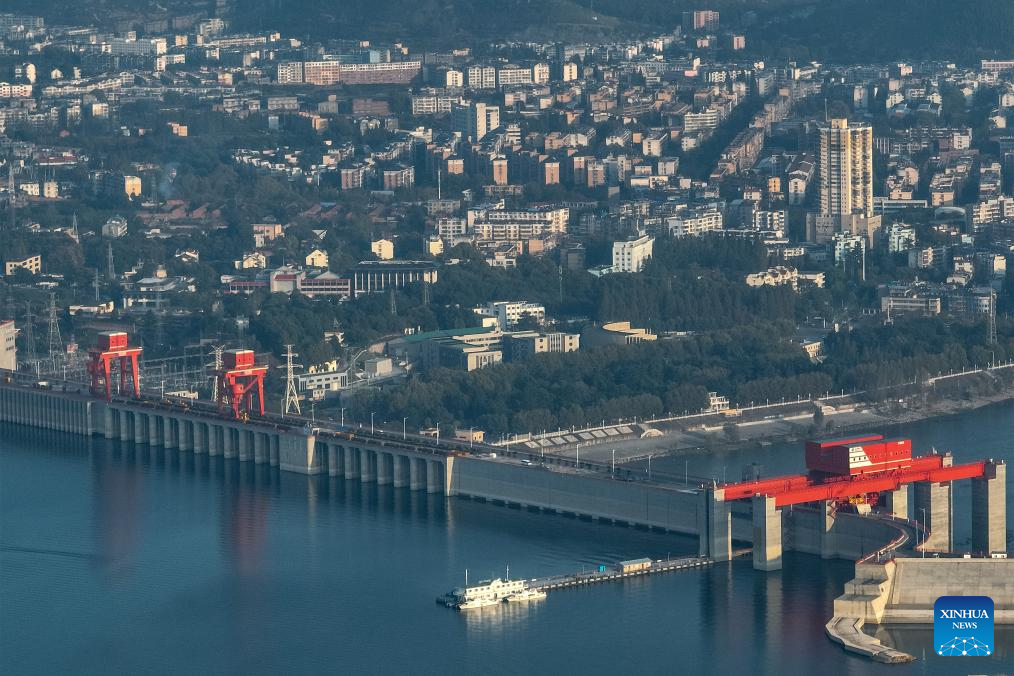
An aerial drone photo taken on Oct. 25, 2024 shows the Danjiangkou Reservoir in central China's Hubei Province. China's South-to-North Water Diversion Project has three routes. The middle route, the most prominent of the three as it feeds water to the nation's capital, starts at the Danjiangkou Reservoir and runs across the Henan and Hebei provinces before reaching Beijing and Tianjin. It began supplying water in December 2014. So far, the middle route has transferred over 68 billion cubic meters of water, and benefited over 100 million people in Beijing, Tianjin, Henan and Hebei. (Xinhua/Wu Zhizun)
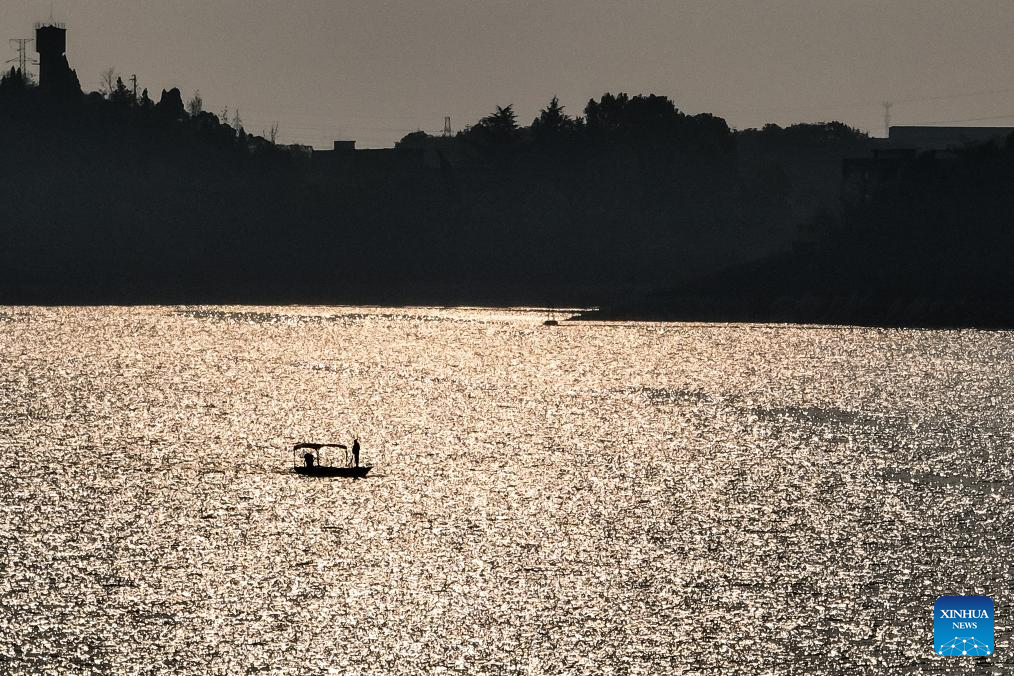
An aerial drone photo taken on Oct. 28, 2024 shows a view of the Danjiangkou Reservoir in central China's Hubei Province. China's South-to-North Water Diversion Project has three routes. The middle route, the most prominent of the three as it feeds water to the nation's capital, starts at the Danjiangkou Reservoir and runs across the Henan and Hebei provinces before reaching Beijing and Tianjin. It began supplying water in December 2014. So far, the middle route has transferred over 68 billion cubic meters of water, and benefited over 100 million people in Beijing, Tianjin, Henan and Hebei. (Xinhua/Wu Zhizun)

An aerial drone photo taken on March 22, 2024 shows the Danjiangkou Reservoir in central China's Hubei Province. China's South-to-North Water Diversion Project has three routes. The middle route, the most prominent of the three as it feeds water to the nation's capital, starts at the Danjiangkou Reservoir and runs across the Henan and Hebei provinces before reaching Beijing and Tianjin. It began supplying water in December 2014. So far, the middle route has transferred over 68 billion cubic meters of water, and benefited over 100 million people in Beijing, Tianjin, Henan and Hebei. (Xinhua/Xiao Yijiu)
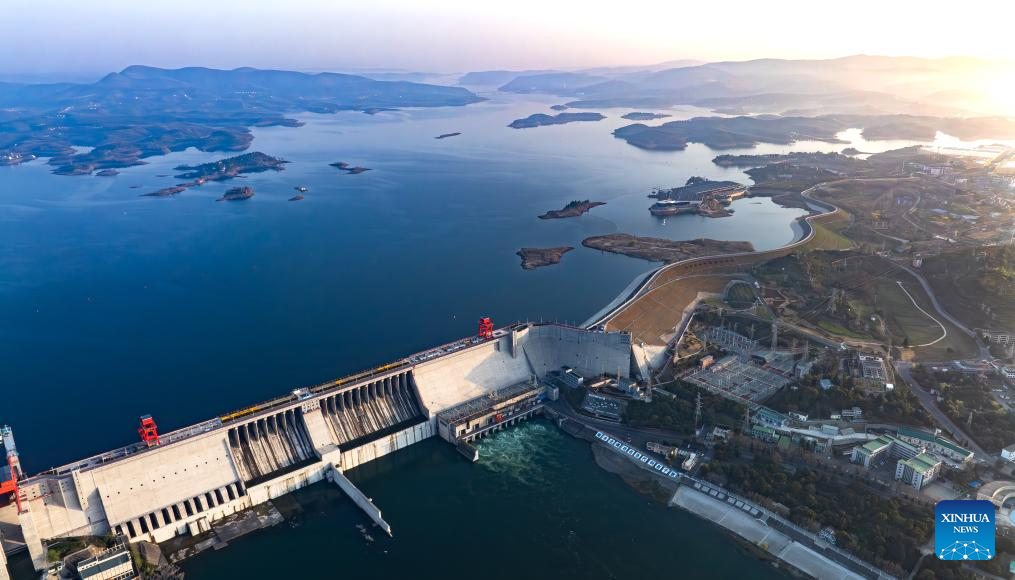
An aerial drone photo taken on March 22, 2024 shows the Danjiangkou Reservoir in central China's Hubei Province. China's South-to-North Water Diversion Project has three routes. The middle route, the most prominent of the three as it feeds water to the nation's capital, starts at the Danjiangkou Reservoir and runs across the Henan and Hebei provinces before reaching Beijing and Tianjin. It began supplying water in December 2014. So far, the middle route has transferred over 68 billion cubic meters of water, and benefited over 100 million people in Beijing, Tianjin, Henan and Hebei. (Xinhua/Xiao Yijiu)
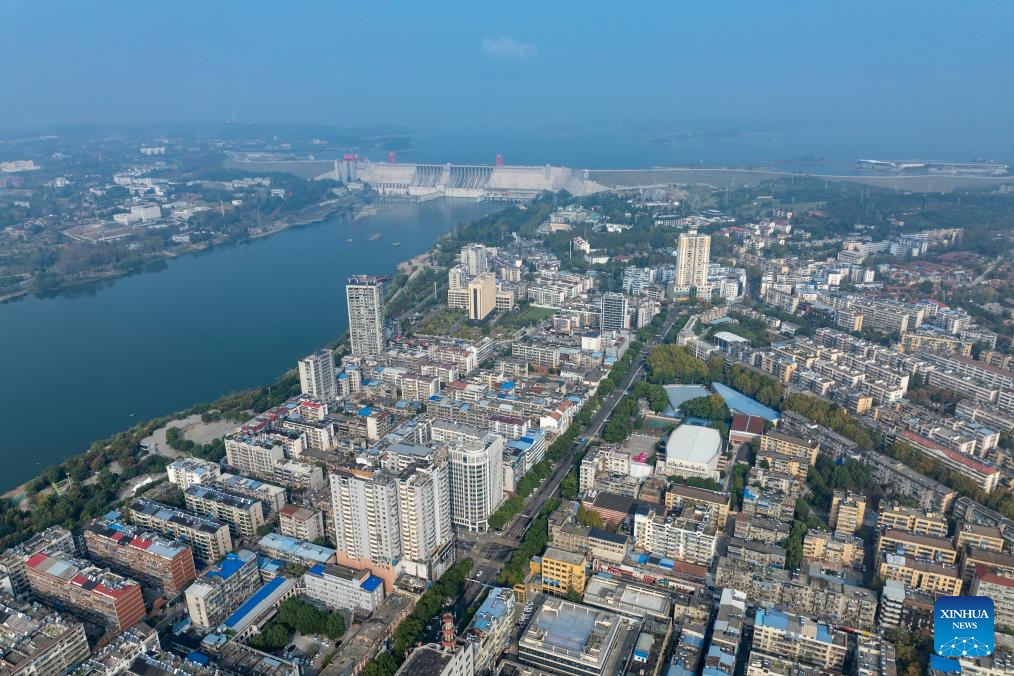
An aerial drone photo taken on Oct. 28, 2024 shows the Danjiangkou Dam and Danjiangkou urban area in central China's Hubei Province. China's South-to-North Water Diversion Project has three routes. The middle route, the most prominent of the three as it feeds water to the nation's capital, starts at the Danjiangkou Reservoir and runs across the Henan and Hebei provinces before reaching Beijing and Tianjin. It began supplying water in December 2014. So far, the middle route has transferred over 68 billion cubic meters of water, and benefited over 100 million people in Beijing, Tianjin, Henan and Hebei. (Xinhua/Wu Zhizun)
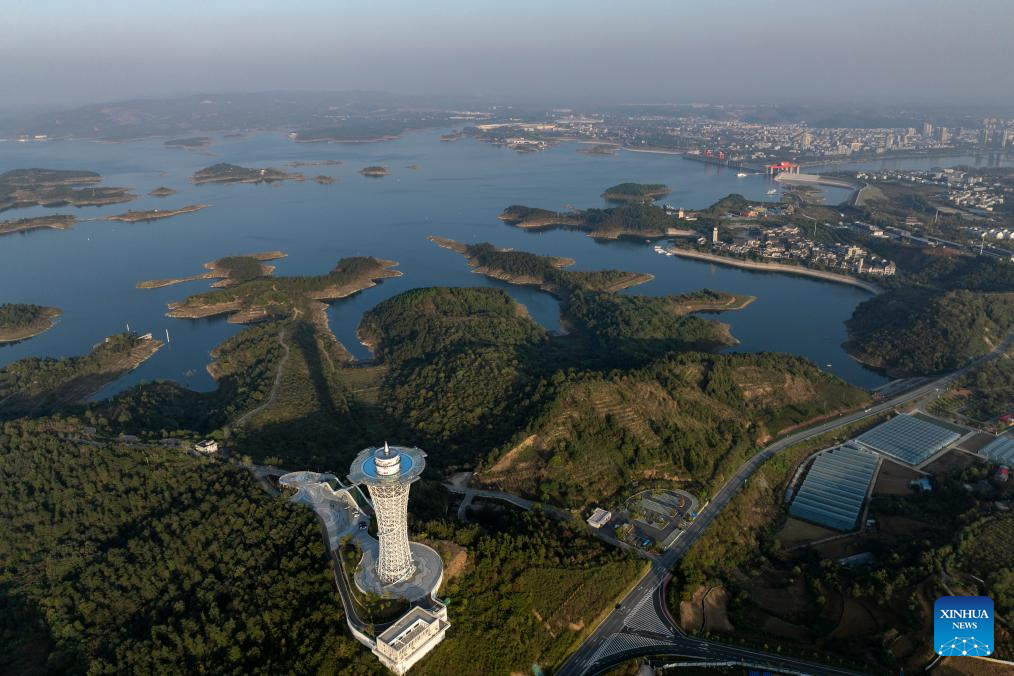
An aerial drone photo taken on Oct. 25, 2024 shows the Danjiangkou Reservoir in central China's Hubei Province. China's South-to-North Water Diversion Project has three routes. The middle route, the most prominent of the three as it feeds water to the nation's capital, starts at the Danjiangkou Reservoir and runs across the Henan and Hebei provinces before reaching Beijing and Tianjin. It began supplying water in December 2014. So far, the middle route has transferred over 68 billion cubic meters of water, and benefited over 100 million people in Beijing, Tianjin, Henan and Hebei. (Xinhua/Wu Zhizun)
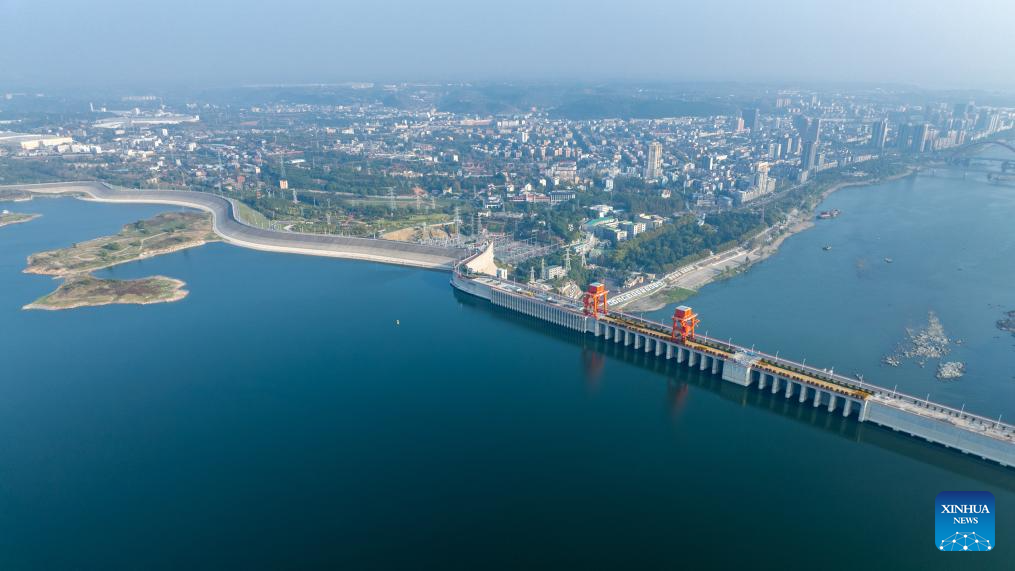
An aerial drone photo taken on Oct. 28, 2024 shows the Danjiangkou Reservoir in central China's Hubei Province. China's South-to-North Water Diversion Project has three routes. The middle route, the most prominent of the three as it feeds water to the nation's capital, starts at the Danjiangkou Reservoir and runs across the Henan and Hebei provinces before reaching Beijing and Tianjin. It began supplying water in December 2014. So far, the middle route has transferred over 68 billion cubic meters of water, and benefited over 100 million people in Beijing, Tianjin, Henan and Hebei. (Xinhua/Hu Jingwen)
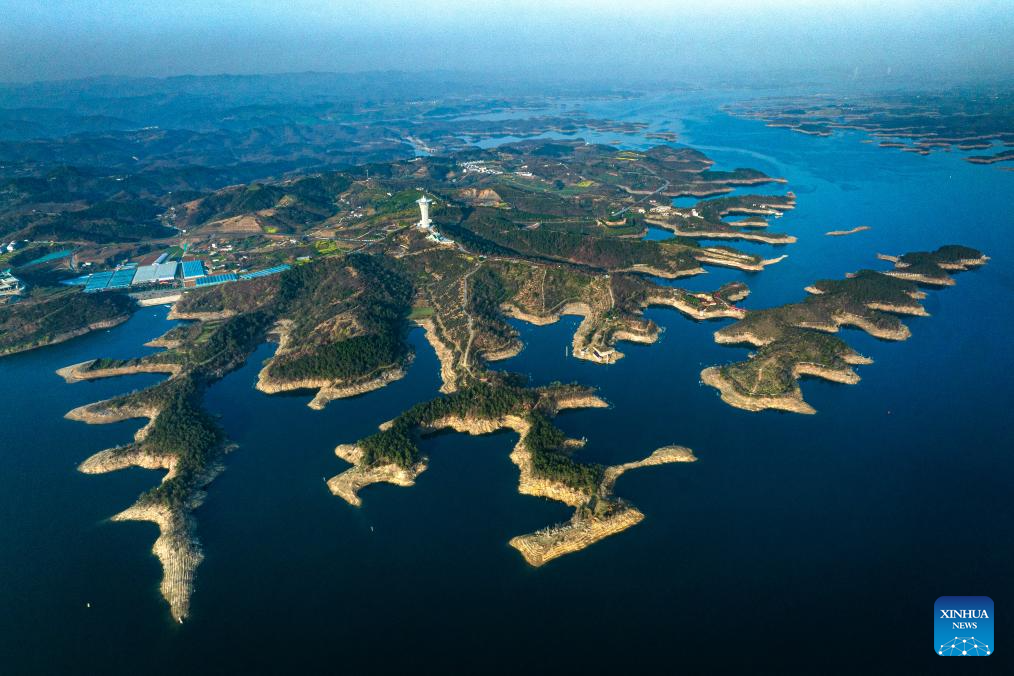
An aerial drone photo taken on March 22, 2024 shows the Danjiangkou Reservoir in central China's Hubei Province. China's South-to-North Water Diversion Project has three routes. The middle route, the most prominent of the three as it feeds water to the nation's capital, starts at the Danjiangkou Reservoir and runs across the Henan and Hebei provinces before reaching Beijing and Tianjin. It began supplying water in December 2014. So far, the middle route has transferred over 68 billion cubic meters of water, and benefited over 100 million people in Beijing, Tianjin, Henan and Hebei. (Xinhua/Xiao Yijiu)
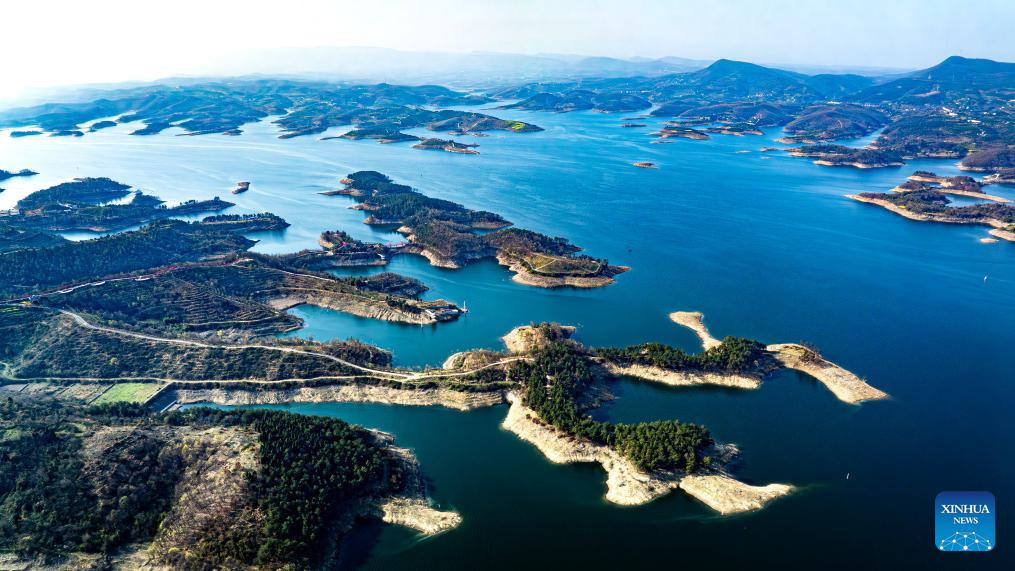
An aerial drone photo taken on March 21, 2024 shows the Danjiangkou Reservoir in central China's Hubei Province. China's South-to-North Water Diversion Project has three routes. The middle route, the most prominent of the three as it feeds water to the nation's capital, starts at the Danjiangkou Reservoir and runs across the Henan and Hebei provinces before reaching Beijing and Tianjin. It began supplying water in December 2014. So far, the middle route has transferred over 68 billion cubic meters of water, and benefited over 100 million people in Beijing, Tianjin, Henan and Hebei. (Xinhua/Xiao Yijiu)
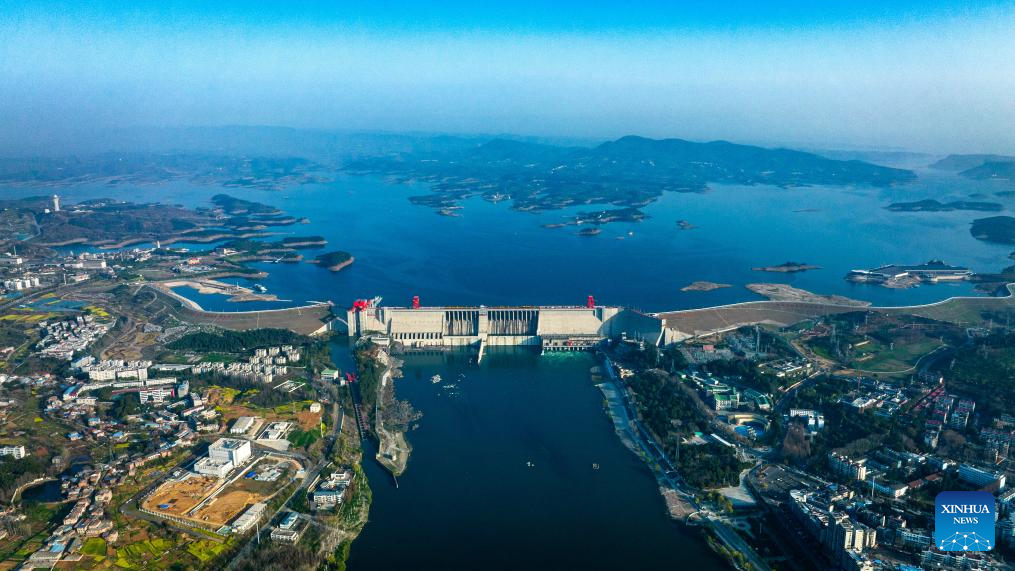
An aerial drone photo taken on March 22, 2024 shows the Danjiangkou Reservoir in central China's Hubei Province. China's South-to-North Water Diversion Project has three routes. The middle route, the most prominent of the three as it feeds water to the nation's capital, starts at the Danjiangkou Reservoir and runs across the Henan and Hebei provinces before reaching Beijing and Tianjin. It began supplying water in December 2014. So far, the middle route has transferred over 68 billion cubic meters of water, and benefited over 100 million people in Beijing, Tianjin, Henan and Hebei. (Xinhua/Xiao Yijiu)



